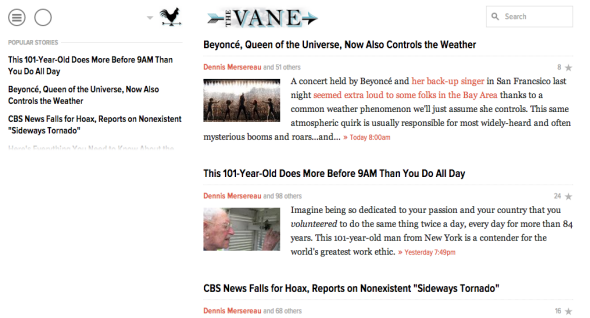There’s no such thing as a “sideways tornado,” but that didn’t stop CBS from reporting on one Wednesday.
To the rescue came Dennis Mersereau, Gawker’s resident weather nerd.
Within 45 minutes of the main @CBSNews account retweeting the repurposed local story from Baltimore, Mersereau was on it, with a story of his own: “CBS News Falls for Hoax, Reports on Nonexistent ‘Sideways Tornado.’ ” Don’t mess with the Mersereau. He will find your weather fables and he will crush them.
Quoth Dennis:
The only problem is that there is no such thing as a sideways tornado, and apparently CBS has no meteorologists (or elementary school graduates) on its payroll to fact check this sideways article.
After Mersereau’s post, CBS rewrote the story and issued a correction, citing a meteorologist from the CBS affiliate in Baltimore, where the story originated: “Editor’s Note: An earlier version of this story incorrectly referred to a weather phenomenon as a ‘sideways tornado’ when in fact it was likely a shelf cloud. CBS News regrets the error.” Shelf clouds, as Mersereau explains, “form when a ‘bubble’ of cool air from a thunderstorm moves across the surface of the earth, lifting warm, moist air above it. As the warm air rises up and over the cooler air, the water vapor condenses into a shelf-shaped cloud.” The clouds are, if anything, a sign of outflow associated with the stable side of a thunderstorm, not the intense inflow usually associated with tornadoes.
Since serving as the leading force behind Gawker’s new weather vertical, The Vane, he’s singlehandedly commanded nearly a million unique monthly views via more than 400 missives ranging from conspiracy theories to science explainers to weather movie reviews. He has a love-hate relationship with the Weather Channel (hey, don’t we all?) and he’s taken on shortcomings within the National Weather Service again and again and again and again. But his bread and butter is the viral debunk.
We need more Dennises. In fact, the National Weather Service itself should be run by Dennis, with each local office headed by a Dennis-like weather blogger tasked with explaining the relevant weather news of the day, and entertaining us when the weather is boring.
Now, in fairness, it’s not the role of the National Weather Service to conduct Dennis-style cumulo-debunkery (although it increasingly has). The role of the National Weather Service is to produce useful science that helps save American lives and property. And it does an excellent job at it. But Mersereau’s best performing post so far was square in the National Weather Service’s wheelhouse: A succinct and readable warning for the city of Chicago that a dangerous derecho was imminently headed their way.
That post wouldn’t have been possible without the decades of research, millions of dollars of supercomputers, and nationwide radar network the National Weather Service commands. Media companies have tried to weasel away weather forecasting from the National Weather Service before. I don’t think that’s necessary. The NWS is great at forecasting the weather.
But their flailing communication of sometimes wonky products is sorely deficient. (My Slate colleague Will Oremus once did a terrific Explainer as to why they use all caps.*) This year, the National Hurricane Center has launched “Inside the Eye,” its own Wordpress blog, and it’s really good. But such excellent communication is in general lacking across the NWS—and that may have consequences. According to one report, confusion in the hours and days before Sandy’s landfall may have led to loss of life despite a generally excellent forecast.
Here’s the deal: Weather forecasting as a science is moving from number-crunching to story-telling. Our predictive capabilities are nearing what may have been considered science fiction only a decade or so ago, but the NWS has largely neglected the most crucial part of the process: meeting people where they are. Hurricane Katrina demonstrated what happens when a society neglects its poor and then expects them to be perfect rational actors in a time of crisis. Meteorologists can only go so far, but they can work with social services agencies to prepare for disasters in advance. It doesn’t much matter whether people get accurate warning information in time if they can’t take action for other reasons. In an era of increasingly extreme weather, what we need are weather communicators—people who speak in words, not acronyms and jargon. And Dennis is the king.
When the hail hits the fan, I want my weather information coming from someone who is supremely accessible, to-the-point, and timely. I want my weather information from Dennis. And—be honest—wouldn’t you rather see Gawker launching satellites and naming storms?
*Correction, Aug. 7, 2014: This blog post originally misidentified the author of a previous Slate piece on the National Weather Service. It was Will Oremus, not Matt Yglesias.
